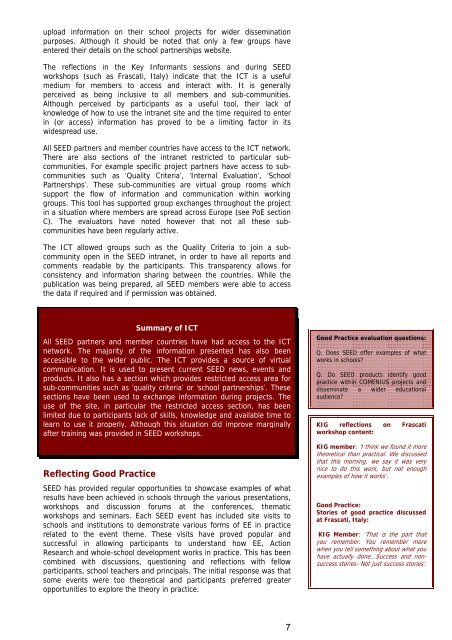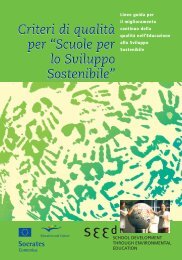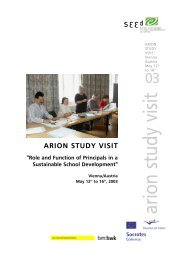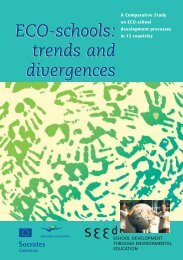External Evaluation of SEED Final Report - SEED - Schule.at
External Evaluation of SEED Final Report - SEED - Schule.at
External Evaluation of SEED Final Report - SEED - Schule.at
You also want an ePaper? Increase the reach of your titles
YUMPU automatically turns print PDFs into web optimized ePapers that Google loves.
upload inform<strong>at</strong>ion on their school projects for wider dissemin<strong>at</strong>ion<br />
purposes. Although it should be noted th<strong>at</strong> only a few groups have<br />
entered their details on the school partnerships website.<br />
The reflections in the Key Informants sessions and during <strong>SEED</strong><br />
workshops (such as Frasc<strong>at</strong>i, Italy) indic<strong>at</strong>e th<strong>at</strong> the ICT is a useful<br />
medium for members to access and interact with. It is generally<br />
perceived as being inclusive to all members and sub-communities.<br />
Although perceived by participants as a useful tool, their lack <strong>of</strong><br />
knowledge <strong>of</strong> how to use the intranet site and the time required to enter<br />
in (or access) inform<strong>at</strong>ion has proved to be a limiting factor in its<br />
widespread use.<br />
All <strong>SEED</strong> partners and member countries have access to the ICT network.<br />
There are also sections <strong>of</strong> the intranet restricted to particular subcommunities.<br />
For example specific project partners have access to subcommunities<br />
such as ‘Quality Criteria’, ‘Internal <strong>Evalu<strong>at</strong>ion</strong>’, ‘School<br />
Partnerships’. These sub-communities are virtual group rooms which<br />
support the flow <strong>of</strong> inform<strong>at</strong>ion and communic<strong>at</strong>ion within working<br />
groups. This tool has supported group exchanges throughout the project<br />
in a situ<strong>at</strong>ion where members are spread across Europe (see PoE section<br />
C). The evalu<strong>at</strong>ors have noted however th<strong>at</strong> not all these subcommunities<br />
have been regularly active.<br />
The ICT allowed groups such as the Quality Criteria to join a subcommunity<br />
open in the <strong>SEED</strong> intranet, in order to have all reports and<br />
comments readable by the participants. This transparency allows for<br />
consistency and inform<strong>at</strong>ion sharing between the countries. While the<br />
public<strong>at</strong>ion was being prepared, all <strong>SEED</strong> members were able to access<br />
the d<strong>at</strong>a if required and if permission was obtained.<br />
Summary <strong>of</strong> ICT<br />
All <strong>SEED</strong> partners and member countries have had access to the ICT<br />
network. The majority <strong>of</strong> the inform<strong>at</strong>ion presented has also been<br />
accessible to the wider public. The ICT provides a source <strong>of</strong> virtual<br />
communic<strong>at</strong>ion. It is used to present current <strong>SEED</strong> news, events and<br />
products. It also has a section which provides restricted access area for<br />
sub-communities such as ‘quality criteria’ or ‘school partnerships’. These<br />
sections have been used to exchange inform<strong>at</strong>ion during projects. The<br />
use <strong>of</strong> the site, in particular the restricted access section, has been<br />
limited due to participants lack <strong>of</strong> skills, knowledge and available time to<br />
learn to use it properly. Although this situ<strong>at</strong>ion did improve marginally<br />
after training was provided in <strong>SEED</strong> workshops.<br />
Reflecting Good Practice<br />
<strong>SEED</strong> has provided regular opportunities to showcase examples <strong>of</strong> wh<strong>at</strong><br />
results have been achieved in schools through the various present<strong>at</strong>ions,<br />
workshops and discussion forums <strong>at</strong> the conferences, them<strong>at</strong>ic<br />
workshops and seminars. Each <strong>SEED</strong> event has included site visits to<br />
schools and institutions to demonstr<strong>at</strong>e various forms <strong>of</strong> EE in practice<br />
rel<strong>at</strong>ed to the event theme. These visits have proved popular and<br />
successful in allowing participants to understand how EE, Action<br />
Research and whole-school development works in practice. This has been<br />
combined with discussions, questioning and reflections with fellow<br />
participants, school teachers and principals. The initial response was th<strong>at</strong><br />
some events were too theoretical and participants preferred gre<strong>at</strong>er<br />
opportunities to explore the theory in practice.<br />
7<br />
Good Practice evalu<strong>at</strong>ion questions:<br />
Q. Does <strong>SEED</strong> <strong>of</strong>fer examples <strong>of</strong> wh<strong>at</strong><br />
works in schools?<br />
Q. Do <strong>SEED</strong> products identify good<br />
practice within COMENIUS projects and<br />
dissemin<strong>at</strong>e a wider educ<strong>at</strong>ional<br />
audience?<br />
KIG reflections on Frasc<strong>at</strong>i<br />
workshop content:<br />
KIG member: ‘I think we found it more<br />
theoretical than practical. We discussed<br />
th<strong>at</strong> this morning, we say it was very<br />
nice to do this work, but not enough<br />
examples <strong>of</strong> how it works’.<br />
Good Practice:<br />
Stories <strong>of</strong> good practice discussed<br />
<strong>at</strong> Frasc<strong>at</strong>i, Italy:<br />
KIG Member: ‘Th<strong>at</strong> is the part th<strong>at</strong><br />
you remember. You remember more<br />
when you tell something about wh<strong>at</strong> you<br />
have actually done...Success and nonsuccess<br />
stories- Not just success stories.’






